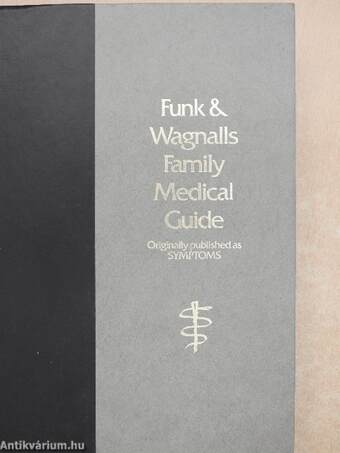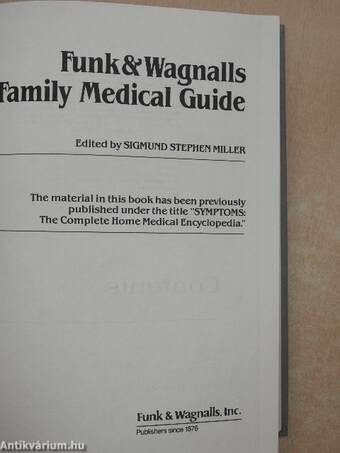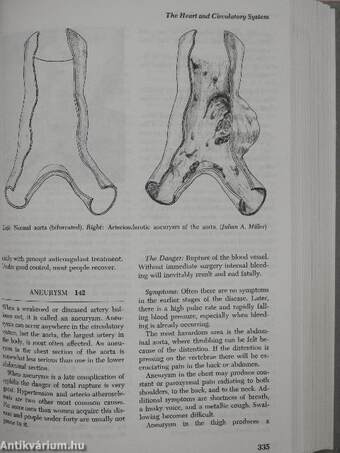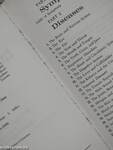1.067.694
kiadvánnyal nyújtjuk Magyarország legnagyobb antikvár könyv-kínálatát

VISSZA
A TETEJÉRE
JAVASLATOKÉszre-
vételek
Funk & Wagnalls Family Medical Guide
The material in this book has been previously published under the title "SYMPTOMS: The Complete Home Medical Encyclopedia."
| Kiadó: | Funk & Wagnalls, Inc. |
|---|---|
| Kiadás helye: | |
| Kiadás éve: | |
| Kötés típusa: | Ragasztott kemény kötés |
| Oldalszám: | 644 oldal |
| Sorozatcím: | |
| Kötetszám: | |
| Nyelv: | Angol |
| Méret: | 23 cm x 16 cm |
| ISBN: | 0-690-01125-3 |
| Megjegyzés: | Fekete-fehér fotókkal, illusztrációkkal. |
naponta értesítjük a beérkező friss
kiadványokról
naponta értesítjük a beérkező friss
kiadványokról
Előszó
Introduction
The uniqueness of Symptoms: The Complete Home Medical Encyclopedia is that it combines and interrelates a book of symptoms (Part 1) with an up-to-the-minute medical reference book... Tovább
Előszó
Introduction
The uniqueness of Symptoms: The Complete Home Medical Encyclopedia is that it combines and interrelates a book of symptoms (Part 1) with an up-to-the-minute medical reference book of disease (Part 2).
The average person knows little about disease, but he does have a keen and intimate knowledge of symptoms. Outside of a few common disorders, he has no idea what he is suffering from. In Symptoms: The Complete Home Medical Encyclopedia, he will quickly know whether his symptoms are unimportant, potentially serious, or serious. In other medical encyclopedias he is obliged to look up his ailment first and then try to find his symptoms—a difficult and frustrating search.
In this book he has some of the best medical minds in the country to help him; he can identify his symptoms, resolve them into a specific ailment, understand the nature of his disease, and decide the best form of procedure.
The saying that a little bit of knowledge can do more harm than good is in itself a statement that does more harm than good. More light is surely better than less light. Our present understanding of the human body is certainly small compared to the ultimate total revelation of how the human body works, yet even with that little bit of knowledge countless numbers of lives have been saved. This book makes expert knowledge easily available to the reader.
We all know that a show of blood in the urine is a dangerous sign, which may be indicative of cancer and/or nephritis. But access to this book and a quick glance under the symptom heading Blood in the Urine will show that besides several forms of cancer and nephritis, blood in the urine is also a common symptom in such disorders as stones in the kidney or bladder, benign tumors in the kidney or bladder, prostate disorders, and vitamin K deficiency—not minor ailments true, but neither are they life-threatening. Such information is readily available in this book.
Another major objective of this book is to enlighten the reader about his own vast potential in fighting disease and maintaining ebullient good health. The aid of the physician, empowered by a great armamentarium of knowledge and constant new discoveries, is often lifesaving, but the patient's own efforts, armed with an equally great armamentarium of will, a thrust for life, and other profound inner resources, can often mean the difference between succumbing and survival.
iv Vissza
Tartalom
PART 1
Symptoms
Table of Symptoms 3 PART 2
Diseases
1. The Brain and Nervous System 207
2. The Eye 225
3. The Ear 242
4. The Nose and Throat 254
5. The Mouth and Tongue 264
6. The Teeth, Gums, and Jaws 271
7. Respiratory Disorders 283
8. The Heart and Circulatory System 308
9. The Digestive System 338
10. The Liver and Gallbladder 375
11. The Kidneys dnd the Urinary System 384
12. Venereal Diseases 396
13. The Female Reproductive System 405
14. The Male Sexual System 425
15. The Joints, Bones, and Muscles 433
16. Allergies and the Skin 448
17. The Skin and Connective Tissue 455
18. Blood and Lymph Diseases 472
19. Metabolism and the Endocrine Glands 480
20. Nutritional and Deficiency Disorders 496
21. Infectious Diseases 504
22. Pediatrics 534
23. Cancer 550
PART 3
New Guideposts
Early Warning Signals 577
Tables, Tests, and Guides 584
A Briefing for Good Health and Long Life 602
GLOSSARY OF MEDICAL TERMS 615 L\DEX OF SYMPTOMS
INDEX OF DISEASES 633-644
III
Témakörök
- Idegennyelv > Idegennyelvű könyvek > Angol > Orvostudomány
- Idegennyelv > Idegennyelvű könyvek > Angol > Háztartástan > Diéta, életmód
- Háztartástan > Életmód > Betegség > Egyéb
- Orvostudomány > Általános orvosi, egyéb > Betegségek > Általában
- Orvostudomány > Általános orvosi, egyéb > Idegennyelvű
- Orvostudomány > Általános orvosi, egyéb > Kézikönyvek, enciklopédiák
- Orvostudomány > Orvosi idegennyelvű könyvek > Általános orvosi
- Orvostudomány > Orvosi idegennyelvű könyvek > Orvosi ismeretterjesztő
- Orvostudomány > Orvosi ismeretterjesztő > Betegségek > Egyéb
- Orvostudomány > Orvosi ismeretterjesztő > Gyógyítás > Egyéb
- Orvostudomány > Orvosi ismeretterjesztő > Idegennyelvű
- Orvostudomány > Orvosi ismeretterjesztő > Kézikönyv
- Orvostudomány > Általános orvosi, egyéb > Terápia > Egyéb














